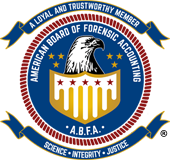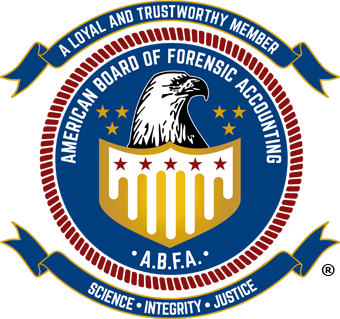Welcome to our Frequently Asked Questions (FAQ) page. We are constantly adding to this page, so please check back periodically for updates.
If you have a question that is not on the page, please contact us at staff@abfa.us.
The American Board of Forensic Accounting (ABFA) was established in 1993 and is the oldest forensic accounting board in the United States, teaching the ‘broad based knowledge’ of forensic accounting.
Setting the Gold Standard — The ABFA has developed advanced instructional design methods along with comprehensive learning objectives to enhance competencies and information retention rates.
Our Certified Forensic Accountant® certification was perceived as one of the most valuable forensic accounting certifications by a group of Independent Experts. The full article may be found here.
Yes, a Certified Public Accounting license (or an international equivalent, such as a Chartered Accountant) is one of the requirements to be accepted into the program.
Yes, our Registered Forensic Investigator (RFI), Certified Forensic Bookkeeper (CFB), Forensic Intelligence Specialist (FIS), Government Forensic Accountant (ABGOV), Certified Cyber Security Accountant–Level 1 (CCSA), Certified Forensic Auditor (CRFAU), and Licensed Healthcare Auditor–Level 1 (LHA) programs do not require a CPA license. Each program has its own unique set of requirements.
A written exam is required for credentialing, along with meeting our other criteria/qualifications. All ABFA examinations are online using a dedicated testing platform. You may take these exams at work or home using a laptop or desktop computer.
There are organizations that do not require a written exam and have certified individuals (past or present) based on their self-attestation. The ABFA believes individuals who want to perform forensic accounting services need to have formal forensic accounting education and training, including written examinations, to assess their core competencies.
It is increasingly commonplace for attorneys to ask expert witnesses if they had to take a written exam to receive their credential(s). We expect this question to be asked by more professionals in the foreseeable future.
As part of the ABFA process, we prepare a scoring matrix and perform due diligence to determine which of our programs and courses best meet your educational and career development needs.
The scoring matrix was developed to ascertain the amount of education and experience you have in accounting and auditing-related topics. We use a point system to determine your preliminary score based on the information you submit with your application. During the process, your score may be adjusted.
Costs will vary depending on which program you are interested in and approved for. The following is a summary:
- First year general membership: $165 for non-student US residents — other fees may be found here
- Forensic Accounting Review (FAR) course: Member price $695 — other prices may be found here
- Healthcare Auditing Review (HAR) course: Member price $235 — other prices may be found here
- Cyber Security for Accounting and Auditing Professionals Review (CAR) course: Member price $235 — other prices may be found here
- Forensic Accounting Video Series (FAVS): Member price $65 per session — other prices may be found here
- Certification exam fee: $585 per certification
For more information, please visit the Payment link at the top of this page.
Please apply online for general membership by using the following link.
There is no initial cost to apply and receive approval for general membership. Once Board approved, you can use the following link for payment.
ABFA is registered with the National Association of State Boards of Accountancy (NASBA) as a sponsor of continuing professional education on the National Registry of CPE Sponsors. State boards of accountancy have final authority on the acceptance of individual courses for CPE credit. Complaints regarding registered sponsors may be submitted to the National Registry of CPE Sponsors through its website: www.nasbaregistry.org.
The ABFA requires fifteen (15) hours per calendar year of continuing education. Individuals are responsible for obtaining and reporting their continuing education to the ABFA. The ABFA offers programs to meet this requirement. For more information, please visit this link.
The Certified Forensic Accountant exam assesses your knowledge and competence in professional forensic accounting services and is fully comprehensive covering forensic accounting, fraud, litigation services, cyber security issues, and valuations.
The Certified Forensic Accountant exam receives lots of input from the academic community along with Certified Forensic Accountants all over the world. The test is currently open book and covers a lot of information. The ABFA wants you to become well versed in the subject matter.
The test is timed and randomly generates objective test questions from a large database. Depending on which objective questions are randomly selected, you may need to use a calculator or your computer to solve some of the questions.
You will need a score of 70% or greater on each section to pass the Certified Forensic Accountant exam.

